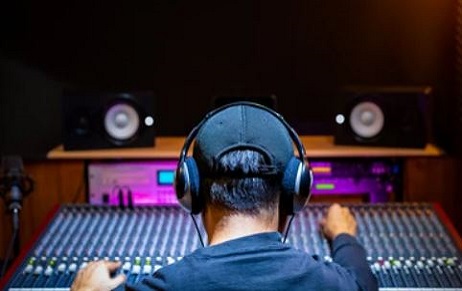A new era started with the innovation of Artificial Intelligence (AI). AI systems can produce…
Harmonizing Creativity and Copyright: Navigating the Landscape of Music Remixes and User-Generated Content
Introduction
A remix in music is attributed to a piece of composition that has been altered and customised from the original piece by adding, eliminating, enlarging certain segments of the music or tune. Today, remixes and mash ups for various songs are a medium to the innovation and creative expression of the artist. With artists experimenting newer variations and combinations everyday, along with developments in technology, the potential and possibilities increase leading to levelling up of the media and entertainment industry.
However, as much as the development of the industry is significant, a coherent balance between creative expression and protection of copyright of the original author is essential. When, in the name of creativity, people start copying the work of original creators, passing it off as their own, the incentive to create quality content reduces and the value and worth of the original creator is at stake. When hard work and talent doesn’t get valued as much as it deserves, the quality of work is affected. Hence, it is essential to ensure copyright protection of original creators.
Main blog
The Indian Copyright Act 1957 regulates protection of copyright in India. Section 2(a) iv defines adaptation in musical work as any arrangement or transcription of the work. In essence, remix is an adaptation of musical work. Further, it is an ambit of sound recording since a remix is essentially created by sound recording an old song containing literary work that is the lyrics which the singer sings composed by the music composer with some modifications and adaptations.
Kanta Laga song is an example of a remixed version of the original song to which video was also added. The original producer of the song complained that the video of the remixed version of the song had women dancing in inappropriate clothes and it was after consent was denied by the producer.
Section 14 of the Copyright Act 1957 defines “copyright” as an exclusive right to do the acts mentioned. Section 51 considers it as infringement when without the license of the copyright owner or in contrary to the licensing agreement, a person does an act for which the exclusive right lies with the copyright owner. In a bare interpretation of the provision, when a person creates remix of a musical work by sound recording, if the license of the copyright owner is not provided, it would amount to infringement.

infringement as per Section 52, if its made
- With consent or license of the owner of the right in the work
- On providing the notice of intention to make the sound recordings, copies of cover or label with which sound recordings are to be sold and royalties paid to the owner
- Further, alterations should not be done without the consent of the owner if it is not reasonable and necessary for the adaptation of the work.
Therefore, as much as the creator of remix keeps in mind the conditions put down by Section 52 emphasising on the fact that alterations not necessary for the remix is not done without the consent of the original owner, the creation of remix comes under fair use and does not violate copyright provisions.
Apart from this, a remix may involve distortion or mutilation of original musical work. Section 57 allows the author to claim authorship of the work as well as restrain or claim damages in case of distortion or mutilation or modification if it is prejudicial to the honour and reputation of the author. This protects moral rights of the original creator.
Today, we see a growth in the expression of creativity through remixes via platforms like Instagram and YouTube which encourage user generated content
User generated content essentially is created by the consumers and users of a platform, service often shared on social media, but not a professional creator. Today UGC has become significant in allowing users to shape the media they create and consume.
A 2007 report by OECD defines User generated content as content made publicly available over the internet reflecting a certain amount of creative work created outside of professional routine and practices. This does not necessarily imply it to be amateur content. The difference between professional and amateur content is determined by its quality. Today many of these online platforms where user generated content is produced use algorithmically driven content moderation to prevent copyright infringement . A very famous one is the content id of You tube which is programmed to detect duplicate copies of the sound of copyrighted material via content identification technology. Copyright owners have an option of automated response by blocking the infringed material, letting it exist live or provide a legal takedown request. An empirical study on the mash up producer’s experience with detection procedures reveal that the content moderation and its role in removing or blocking the remixed work of producers lead to a reduction in motivation which also stems from the ambiguity in respect of enforcement of content moderation.
Conclusion
In the evolving landscape of music remixes and user-generated content, the delicate balance between creative expression and copyright protection is crucial. While remixes serve as a medium for artistic innovation, adherence to copyright provisions and mechanisms for content moderation are essential to uphold the integrity of original works and foster a sustainable creative ecosystem.
Author: Sonisha Srinivasan, in case of any queries please contact/write back to us via email to [email protected] or at IIPRD.
References:
- Indian Copyright Act 1957
- Mendis, S. (2024). Copyright Enforcement on Social Media Platforms: Implications for Freedom of Expression in the Digital Public Sphere. In: Werthner, H., et al.Introduction to Digital Humanism. Springer, Cham. https://doi.org/10.1007/978-3-031-45304-5_29
- Brovig-Hanssen, R., & Jones, E. (2023). Remix’s retreat? Content moderation, copyright law and mashup music. New Media & Society, 25(6), 1271-1289. https://doi.org/10.1177/14614448211026059
- Accountability in algorithmic copyright enforcement ,19 STAN.TECH. L.REV. 473 (2016), https://law.stanford.edu/wp-content/uploads/2016/10/Accountability-in-Algorithmic-Copyright-Enforcement.pdf
- Sakshi Shairwal and Tanisha Sharma, Legality of remix music in accordance with copyright laws in India,(31 January 2022), https://www.lexology.com/library/detail.aspx?g=f9a18338-7502-4bbd-ae32-5dca7761cd3c
- Swati Pragyan Sahoo, An analysis of the legality of remix culture: compliance or violation of copyright laws, (February 15 2023), https://articles.manupatra.com/article-details/AN-ANALYSIS-OF-LEGALITY-OF-REMIX-CULTURE-COMPLIANCE-OR-VIOLATION-OF-COPYRIGHT-LAWS
- Guilda Rostama, Remix Culture and Amateur Creativity: A Copyright Dilema,(June 2015) https://www.wipo.int/wipo_magazine/en/2015/03/article_0006.html
- Oshani Seneviratne, Andrés Monro Hernandez, Remix Culture on the web: A survey of content re-use on different user generated content websites, (April 2010),https://www.academia.edu/3959384/Remix_culture_on_the_web_A_survey_of_content_reuse_on_different_User_Generated_content_websites
- Naik and Naik Co., Impact of user generated content on Indian Culture, How it influenced cultural expression, traditions and art forms, (November 24 2023) https://naiknaik.com/2023/11/04/impact-of-user-generated-content-on-indian-culture-influence-on-cultural-expressions-traditions-art-forms/



